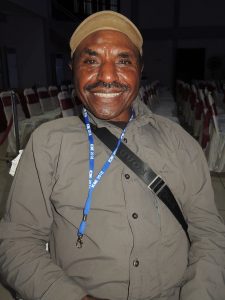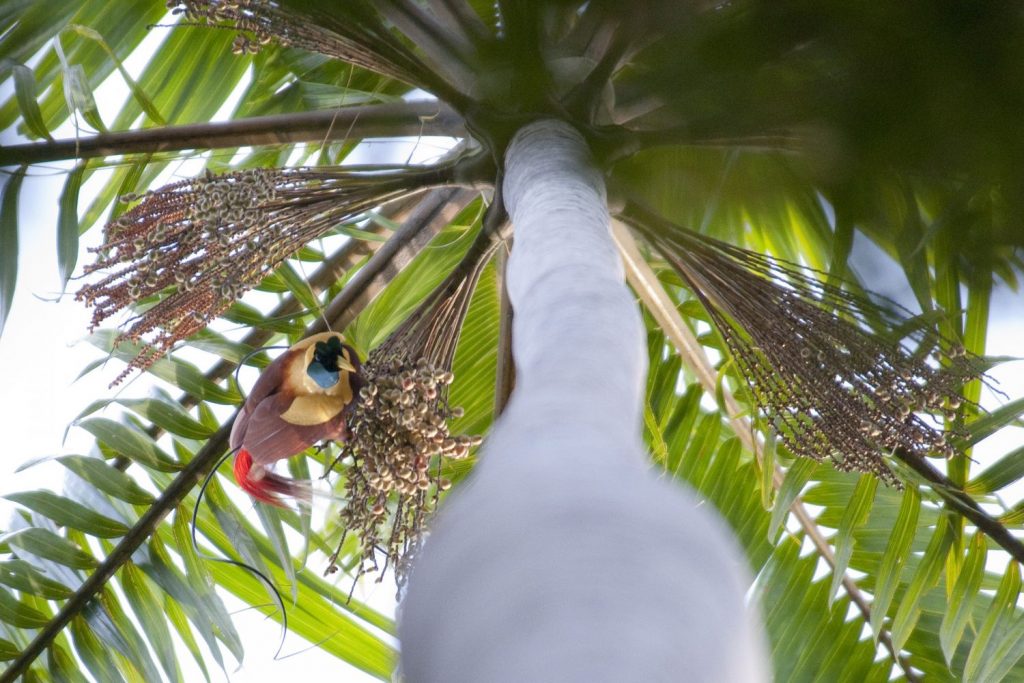Zeth Waggor is a legendary guide for birds-of-paradise in the Arfak Mountains, the premier birdwatching destination in West Papua, Indonesia. However, 28 years ago, the Papuan man was an experienced hunter of the birds that nowadays he protects and promotes.
The 46-year-old man from the Hattam tribe lost his father when he has just a child, and without money, he had to give up school and go to the forest. He made a traditional house there, and for 12 years he hunted the birds to feed himself.
In 1990, a white man tried to reach the Arfak Mountains, and asked the local people for ‘help to walk in the forest, but they were afraid because before there was a problem between the Dutch and the Japanese in Manokwari”, Zeth Waggor said. In the 40s, West Papua was stage for a war between the Dutch and the Japanese, and since then the local people “were afraid of the white men,” he explained.

Zeth Waggor at the “International Conference on Biodiversity, Eco-Tourism, and Creative Economy of Papua”, held in Manokwari from the 7th October to the 10th October 2018
That’s why they suggested the white man to look for Zeth’s house. When they met each other, the Papuan hunter got surprised to meet a white man who knew his name and even wanted to stay with him and walk with him through the forest.
Zeth was ready to hunt for their meals when he suddenly saw the white man staring at a bird. “I took a stone, and I threw it, but he said no”, he remembered. The visitor just wanted to take pictures of the birds-of-paradise and watch them dancing from the hidden places Zeth had created to hunt them.
When they came back home, the Papuan man was frustrated because he had no birds for their meals, but suddenly, the white man gave him money. “I kept the money because I don’t understand about money. If we walked to Manokwari [the closest city], it was too far, so we only ate from the garden”, he said.
Later on, the visitor came back to the Arfak mountains with a group, including the English broadcaster and naturalist David Attenborough. In exchange, the guide got “a lot of money” and went to the city to buy “new doors”, “very good fish” and many things he needed. Then, he instructed the other villagers to not hunt birds nor cuscus anymore. He got binoculars and he could see from a different perspective the birds that he hunted before.
As more money was coming in, Zeth created places for birdwatching close to the houses instead of in the mountains, and “birds of all species came close to the villages” because there was no hunting anymore. From that moment, “women and young children carry the bags and follow the guests to get money”, something that wouldn’t be possible in the mountains, he emphasized. Furthermore, new businesses started to flourish in the area to support the growing tourist activity, such as sale of vegetables, bags, and firewood.
“We have the forest and we understand. No one from the government nor other people talked to me, but the money told us to stop,” he underlined. Otherwise, he said, “everything would be destroyed” in the forest.
According to Zeth Waggor, every year almost 300 tourists visit the area, and about 450 people from five villages rely on this business.
Arfak Mountains are home for eight species of bird-of-paradise, namely Long-tailed paradigalla, Western parotia Black sicklebill, Arfak astrapia, Magnificent bird-of-paradise, Superb bird-of-paradise, Black-billed sicklebill, Trumpet manucode, and Magnificent riflebird.
There are at least 39 species of bird-of-paradise, and they can be found in eastern Indonesia, Papua New Guinea, and eastern Australia. Until recently hunting them was a common activity to feed people and to get their colorful feathers, which were used in various dresses and rituals. Nowadays, the Birds-of-Paradise are protected by law, and their dances and poses combined with their colorful plumage may them a world attraction.

Red Bird-of-Paradise
Zeth Waggor became an expert on this bird, and he also guided tourists and photographers, such as the American ornithologist and wildlife photojournalist Tim Laman, in other areas of Papua.
From the beginning of his trips with guests, Zeth Waggor started to take leaves as he walked through the forest to write down the words he could learn from his guests after asking them the meaning.
Nowadays, the self-trained guide can have a long conversation in English, always mixed with laughs and smiles. In fact, 28 years have passed, but his surprise and enthusiasm with the blessings coming from nature are renewed at every minute. “The guests smile and the local people smile too” he repeated several times.
The RARCC partners Papua Diving and Kayak4Conservation offer their guests the opportunity to do a sightseeing trip on Waigeo for the Red Bird-of-Paradise and the Wilson’s Bird-of-Paradise. By working with local guides, they are supporting the local community and protecting the fauna. Find more information about the trips here.











